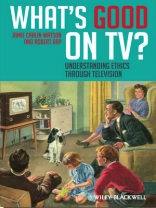What’s Good on TV? Understanding Ethics Through Television
presents an introduction to the basic theories and concepts of
moral philosophy using concrete examples from classic and
contemporary television shows.
* Utilizes clear examples from popular contemporary and classic
television shows, such as The Office, Law and Order,
Star Trek and Family Guy, to illustrate complex
philosophical concepts
* Designed to be used as a stand-alone or supplementary
introductory ethics text
* Features case studies, study questions, and suggested
readings
* Episodes mentioned are from a wide variety of television shows,
and are easily accessible
* Offers a balanced treatment of a number of controversial
ethical issues including environmental ethics, animal welfare,
abortion, homosexuality, capital punishment, assisted suicide,
censorship and the erosion of values
* Includes a companion website at href=’http://whatsgoodontv.webs.com/’>http://whatsgoodontv.webs.com
Зміст
Preface.
The Pilot Episode: Ethics and Popular Culture.
Series I. Is anything ‘good’ on television? The Nature of Moral Value.
Episode 1: Truth and Nihilism in Ethics.
Episode 2: Normativity–Social, Legal, and Moral.
Episode 3: God and Ethics.
Series II. What’s right and wrong? Ethical Theory.
Episode 4: Relativism.
Episode 5: Deontology.
Episode 6: Consequentialism.
Episode 7: Virtue Ethics.
Series III. But what’s right when…? Practical Ethics.
Episode 8: Environmental Ethics.
Episode 9: Animal Welfare.
Episode 10: Abortion.
Episode 11: Homosexuality.
Episode 12: Punishment and Capital Punishment.
Episode 13: Assisted Suicide .
The Epilogue: Does TV Erode Our Values?
Про автора
Jamie Carlin Watson is Assistant Professor of Philosophy and
Chair of the Department of Religion and Philosophy at Young Harris
College, Young Harris, Georgia. He has published in the fields of
philosophy of science and popular culture and philosophy. His
current research is in the epistemology of a priori
justification.
Robert Arp taught aspects of philosophy at several
colleges and universities, including Southwest Minnesota State
University, Florida State University, and Saint Louis University.
He has published works in many philosophical areas, including
philosophy of biology, philosophy of mind, and popular culture and
philosophy.












